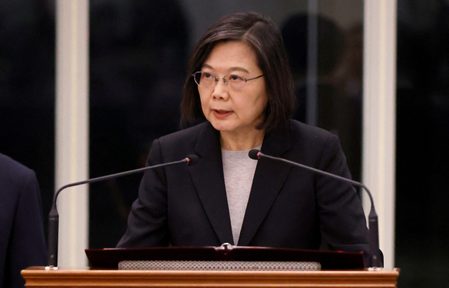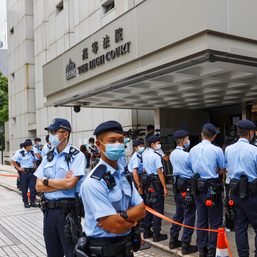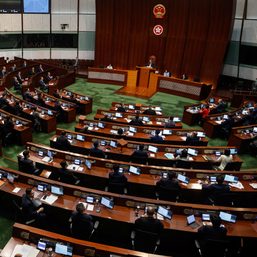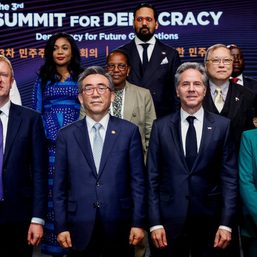SUMMARY
This is AI generated summarization, which may have errors. For context, always refer to the full article.
![[OPINION] Does Taiwan have a right to independence?](https://www.rappler.com/tachyon/2023/06/DOES-TAIWAN-HAVE-A-RIGHT-TO-INDEPENDENCE.jpg)
From a historical perspective, undoubtedly, “yes.” In the context of legal, international law, arguably, “yes.” But bilateral, legal-diplomatic disputes and multilateral negotiations in the United Nations often depend on the relative power available to the contending parties. Can Taiwan, by itself, enforce its right to independence in a military confrontation against the People’s Republic of China (PRC)? Categorically, “no.” The question, crucial to the moral basis for supporting Taiwan and the risk of conflict with the PRC, rightly concerns Filipinos.
The PRC asserts ownership of Taiwan, as of the South China Sea, based on “historic rights;” both claims are best taken with a sackful of salt. Dynastic historians proclaim China as “Ruler of All under Heaven,” whose supremacy other kingdoms must acknowledge by paying tribute. The emperor could then give gifts to these inferior states, making the tribute system a mechanism for trade. At its peak, the Qing Empire (1644-1912) did exercise over parts of India, Burma, and Vietnam varying levels of military and political control, neither permanent nor automatically inheritable.
But power rises and ebbs. Sixteenth century Portuguese explorers named the island Formosa (Beautiful), for its beauty and convenience as a base for commerce. The Dutch East India Company agreed, establishing “Dutch Formosa” for its own trading network. The Qing Empire successfully invaded Taiwan in 1683 to suppress Koxinga, a Ming Dynasty loyalist, who also launched piratical attacks against Spanish Manila’s shipping and trade. Formosa remained nominally a Qing Dynasty dependency, until it lost a war and the island to Japan in 1895.
Losing the Pacific War to the Allies in turn, Japan had to return Taiwan to Kuomintang’s Republic of China (ROC) of Chiang Kai-shek. With the victory of Mao Zedong’s PRC in China’s civil war, the remnants of Chiang’s forces fled to Formosa, where it initially ruled the indigenous Taiwanese, like as an occupying, ethnic Chinese colonial power. Both the Taiwanese and the Chinese nationalists eventually accepted the need to share the island, as the ROC lost China’s seat in the UN in 1971, effectively ending its dream of recapturing the mainland.
The historical reality remains: Taiwan never came under PRC rule nor ever submitted to being governed by the PRC without its consent – unlike Ukraine, which was once a part of the USSR. At some point in their political history, the 190 members states of the UN had undergone formal or informal colonial rule by stronger powers. The United States won its independence in 1776, after fighting England. In Southeast Asia, Timor Leste won its independence only in 2011, after fighting a war against Indonesia. China has a better historical claim to Vietnam than to Taiwan.
The idea that a group of people imagining itself to be distinct from others has the right to self-government gained currency only in the late 18th and 19th centuries. The unifying bond may be a shared ethnicity, language or culture, or a common religion. Ultimately, the compelling vision comes from commitment to a set of ideas and values, as were enshrined and proclaimed in the American Declaration of Independence: “We hold these truths to be self-evident.”
Whether mystical or mythic, the abiding belief in a distinct national identity, unifying otherwise diverse groups of people, often draws sustenance and strength from the experience of the community’s actual and imagined shared suffering and sacrifice at the hands of an oppressive, foreign force – even when the individual victims may be strangers to each other.
In the hot global wars and the Cold War of the 20th century, nationalism has proven more effective in forging unity than capitalist or communist ideologies. Only religion has offered as powerful an appeal to rally the faithful. Nationalism has become the secular religion, invoked by both Putin and Xi Jinping to support their policies. Putin aspires to revive not the USSR but the Russian Tsarist Empire. More than the expansion of communism, Xi seeks the restoration of the hegemony the Chinese Middle Kingdom once exercised over the world it touched.
Russian and Chinese nationalism inevitably inspires the counter-nationalism of the Ukrainians, including those with Russian ethnicity and language, and of the Taiwanese, all Mandarin speakers and most of Chinese descent. Foundational elements of blood, language, and religion promote but do not require nationhood as these primordial ties submit to one government. Otherwise, Canada and the United States would constitute one nation, as would a large portion of the Middle East.
American self-evident truths – “all men are created equal;” inalienable rights;” “governments deriving…from the consent of the governed” – have become principles of the international order. Even the most disreputable autocratic regimes routinely proclaim themselves democratic and insist that they govern with the mandate of the people. Since Mao Zedong, the PRC has ambitioned to overturn this post-war international order based on “historic rights” anchored on ethnicity, culture, and conquest.
Thus, the PRC has asserted its command over the loyalty of the overseas Chinese, not just temporary immigrants abroad for studies or work, but even those who have pledged allegiance to other nations. Xi Jinping has aggressively promoted the United Front strategy to monitor and influence, if not coerce, people raised in the Confucian culture. Where it exerts direct control, as in Tibet and Xinjiang, the PRC can attempt the process of replacing the indigenous languages and religions, cultures, and even populations.
We condemn, as we should, Western colonial powers in a less enlightened age, whose policies, however, poorly and inconsistently practiced, also tended towards these outcomes. Why should these be tolerated now, when the powers who pose the threat possess greater resource for its execution, not just against current targets but any smaller and weaker nation?
Does Taiwan have a right to independence? Depends on the international order you would prefer to see prevail, based on rights or on force. – Rappler.com
Edilberto de Jesus is a senior research fellow at the Ateneo School of Government.
Add a comment
How does this make you feel?






There are no comments yet. Add your comment to start the conversation.